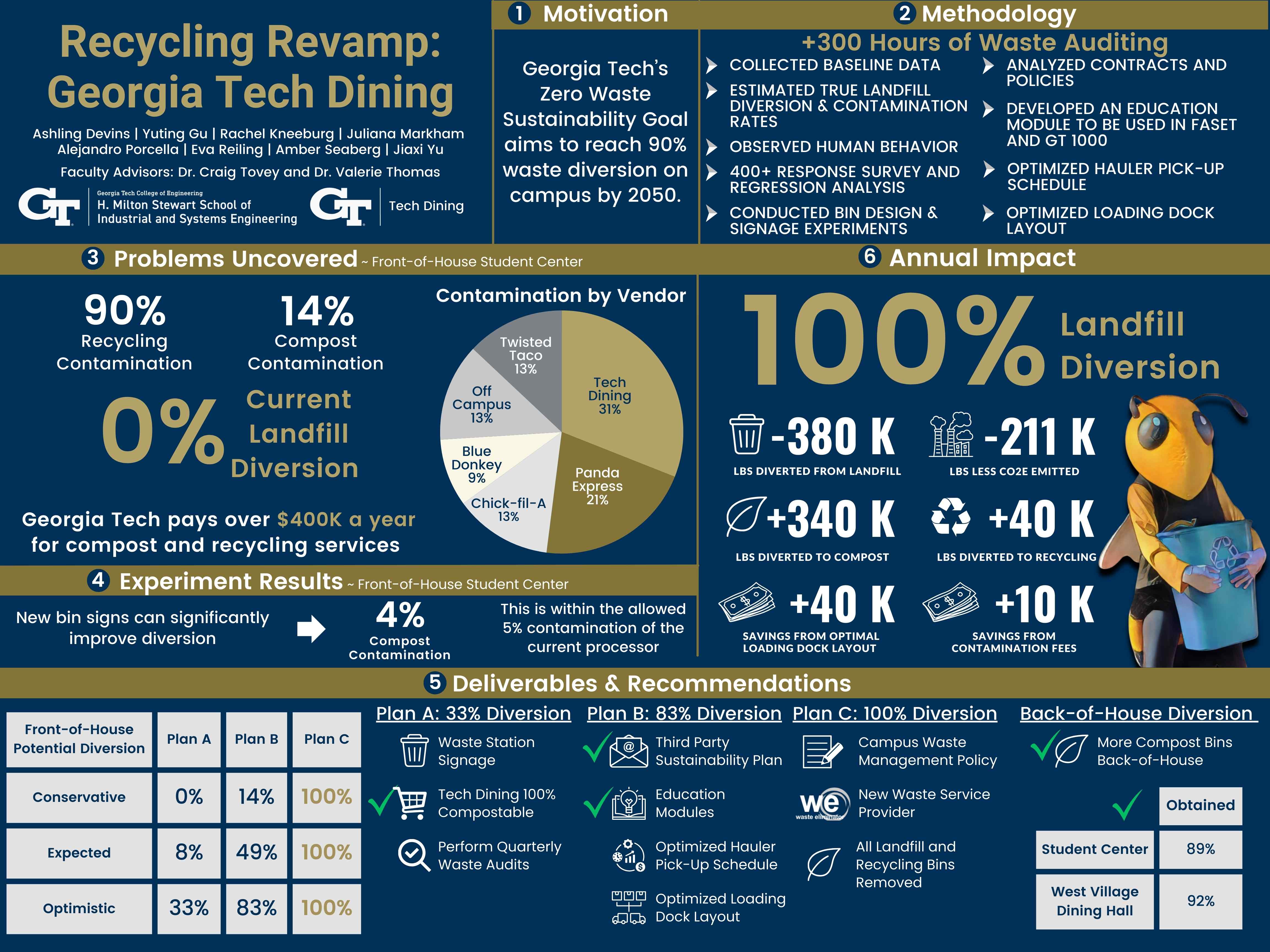Description
The goal of this project is to bring Tech Dining in line with the Institute’s 2050 Zero Waste (>90% landfill diversion) goal for campus. Following extensive data collection involving over 300 hours of waste auditing, human observations, and survey administration to 400 students, the team identified critical challenges within Tech Dining's waste management systems. Currently, despite paying over $400,000 per year for recycling and composting services, the front-of-house system (comprising the John Lewis Student Center, a.k.a. JLSC) has a 0% landfill diversion rate due to high contamination in compost and recycling streams.
The team’s human observations reveal a significant number of students tend to indiscriminately dispose of all waste in a single bin, with the majority defaulting to the landfill. Regression analysis on survey results indicate students lack waste sorting education, have limited understanding of compost, and perceive the signage in the JLSC to be ineffective.
To address these challenges, the team developed plans for both front-of-house and back-of-house systems, aiming to achieve zero waste status for both systems within Tech Dining. The front-of-house plan involves a 3-phase strategy with the potential to increase landfill diversion to 33% by 2024, 83% by 2025, and 100% by 2030 in an optimistic scenario. The back-of-house recommendations include strategically placing additional compost bins near food prep stations; the back-of-house has successfully implemented the supplied recommendations and attained zero waste status.
To develop these plans, the team conducted experiments to assess the impact of various signage and bin types on student behavior and contamination levels within the front-of-house waste streams. Simultaneously, the team designed an education module which Georgia Tech has agreed to implement in FASET and GT1000 to enhance students’ ability and motivation to recycle and compost accurately. Also, the group developed two optimization models: one to ascertain an ideal trash yard (loading dock) layout behind the JLSC, capable of accommodating the anticipated increase in compost and recyclables leaving the JLSC as students adopt proper waste sorting practices, and another to minimize waste pick-up costs for Georgia Tech.
Furthermore, the team drafted a Waste Management Policy for Georgia Tech, aimed at standardizing waste bin and signage types while establishing guidelines for procurement, education, and operational support for waste management across campus. This policy is being discussed by Georgia Tech Sustainability. To transition the front-of-house to zero waste, it was determined Tech Dining should adopt 100% compostable products. To help them reach this goal, the team identified 46 compostable alternatives to replace their existing non-compostable counterparts. Tech Dining has already made the procurement changes the team suggested. The group also identified and interviewed potential waste haulers that can replace Georgia Tech’s existing compost hauler and have higher contamination rate thresholds.
The proposed solutions estimate significant environmental and financial benefits. The implementation of said plans could save Tech Dining from landfilling 380,000 pounds of waste annually, diverting 40,000 pounds to recycling and 340,000 pounds to compost. This translates to an annual reduction of greenhouse gas emissions equivalent to the yearly output of 21 cars. Additionally, implementing the waste hauler recommendation could save Tech Dining $10,000 annually, and implementing the optimized pick-up schedule would save Georgia Tech $37,000 annually. Implementing the recommended loading dock design when Georgia Tech achieves 100% landfill diversion would save Georgia Tech $42,000 annually.
In conclusion, the team’s recommendations provide a comprehensive framework for Tech Dining to reach 100% landfill diversion and meet the Institute’s zero waste goals, while saving money in fines and hauler pick-up costs.

| Department |
Industrial & Systems Engineering |
| Sponsor |
Malte Weiland |
| Advisor |
Craig Tovey |
| Primary Email Contact |
adevins@gatech.edu |
| Table # |
R30 |
Members
| Name |
Major |
Hometown |
| Alejandro Porcella |
IE |
Santo Domingo, Dominican Republic |
| Ashling Devins |
IE |
Stavanger, Norway |
| Eva Reiling |
IE |
Arlington, Virginia |
| Jiaxi Yu |
IE |
Beijing, China |
| Juliana Markham |
IE |
Atlanta, Georgia |
| Lea Seaberg |
IE |
Tampa, Florida |
| Rachel Kneeburg |
IE |
Cumming, Georgia |
| Yuting Gu |
IE |
Luoyang, China |
|
|
